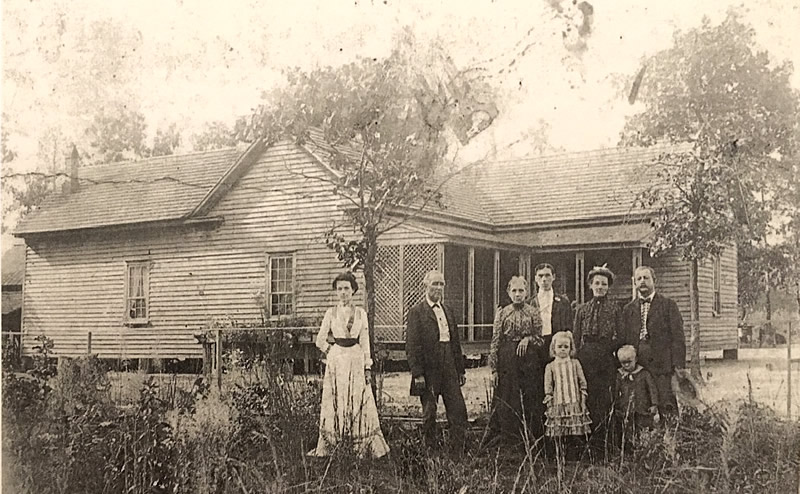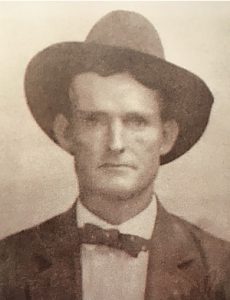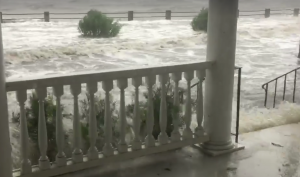
The middle Georgia farm home in which Charles Columbus Brack died 100 years ago. The photo, taken in 1902, shows another family in front of the building. (Photo provided by Ed Cunard’s “A Book About Allentown … Georgia, That Is.“
By Andy Brack, editor and publisher | One hundred years ago yesterday, my great-grandfather, weakened by the flu, died of what’s believed to have been a ruptured appendix. He was 38 years old. The season’s cash crop, cotton, was about ready to pop in the fields.
 Charles Columbus Brack left a 31-year-old widow and six children, aged 1 to 10. They lived in rural middle Georgia in an unpainted house five miles from the nearest town. It was only a mile from their Baptist church where a family reunion of sorts occurred yesterday.
Charles Columbus Brack left a 31-year-old widow and six children, aged 1 to 10. They lived in rural middle Georgia in an unpainted house five miles from the nearest town. It was only a mile from their Baptist church where a family reunion of sorts occurred yesterday.
Tables in the church hall showcased just about every sort of Southern food – from fried chicken and roast beef to at least four kinds of beans, macaroni and cheese, potato salad, rice salad, and plain salad salad. The dessert table was almost as long with the 16-layer chocolate cake being the talk of the room. (I liked the caramel cake.)
As I viewed my great-grandfather’s gravestone surrounded by the red dirt of middle Georgia, I realized the Chamber of Commerce clear skies and temperature in the mid-80s were probably much like those on the day he died. On that day, my 8-year-old grandfather and his 10-year-old brother became the “men of the house.” Granddaddy reportedly never returned to school because he had to work in the cotton field that the family rented. He toiled on the tenant farm for more than two decades until he and his family moved to Macon, Ga., just before World War II. Family records show that at the height of the Depression, he earned $60 from one year’s cotton crop.
My, how things have changed. One hundred years ago, the Dow Jones Industrial Average was about 75 points, only to plunge 41.22 at the lowest point of the Depression. It’s now more than 22,000. Imagine that. Back then, mules and wagons were the main transportation; these days, cars and planes rule the roost.
One hundred years ago, millions of Southerners, black and white, lived in poverty on small farms, either rented or sharecropped. As the government worked to shore up the economy with an alphabet of New Deal programs, displaced tenants often moved to cities to try to find work. Opportunities increased with an industrial boom caused by World War II.
In the years since, the South has undergone an economic and cultural transformation brought on by better education, civil rights protections, economic investment, flocks of retirees from other states, air conditioning, better transportation, and technology that seemed a dream when Star Trek was first aired.
One hundred years ago, my great-grandfather likely would have never imagined today’s interconnected South where a free phone call over the Internet to the other side of the world is just a click away. Throughout the South, we’ve still got problems, particularly with the widening gap between rich and poor. But it is way better than the way things were a century ago.
Also of note:
THE LAST WEEK has been hard on the South with Hurricane Irma pounding the Atlantic coast with storm surge and knocking down trees and power lines in a windy swath that cut from Florida through Georgia, South Carolina and Tennessee. Our sister publication, Statehouse Report, offered this photo essay to give you an idea of the impact on the Palmetto State.
BEING PREPARED. The most recent Statehouse Report column proposes a new disaster fund to help South Carolina be better prepared for future storms. An excerpt:
“Maybe it’s time to start being more proactive fiscally with the natural disasters that seem to be more frequent in the Palmetto State.
“Regardless of the cause — Mother Nature, climate change or the wrath of God — the flooding in the Midlands and Pee Dee in 2015, Hurricane Matthew in 2016 and Hurricane Irma this year have been expensive propositions.
“While state and local officials already get specialized training ahead of disasters to be prepared, state government doesn’t budget for storm costs in advance. Instead, it pays the bill long after the storm or disaster has passed.”
- Have a comment? Send to: editor@charlestoncurrents.com






 We Can Do Better, South Carolina!
We Can Do Better, South Carolina!

























2 Comments